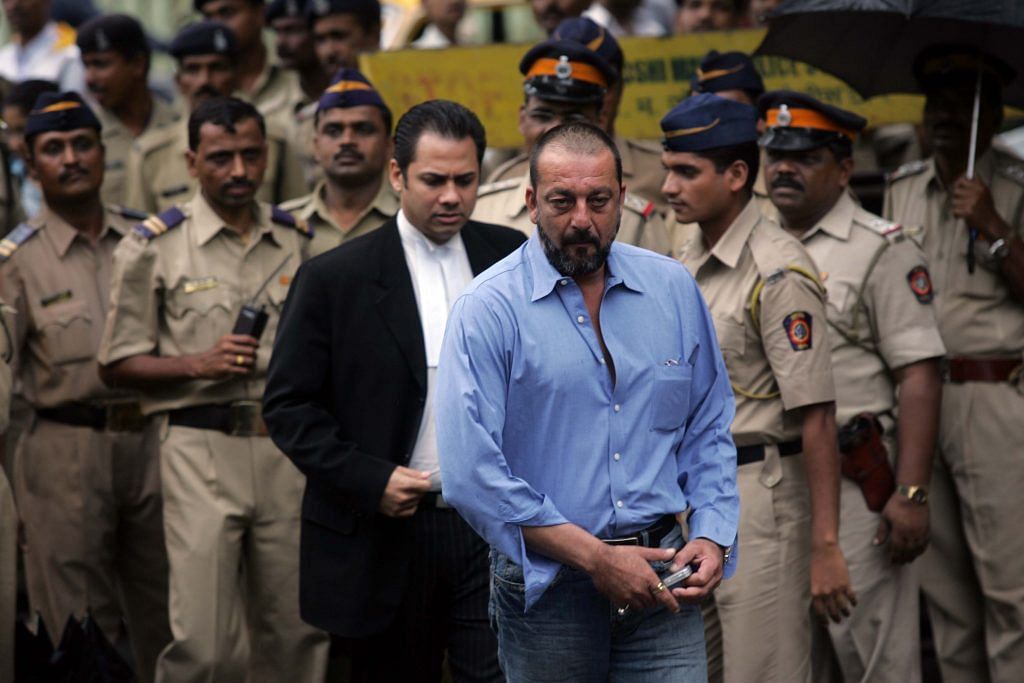In his gangster roles in movies, Sanjay Dutt made us believe he would not have been a criminal had circumstances been different.
Sanjay Dutt is among my favourite badass actors in Bollywood – especially when he plays a gangster.
He made us empathise with the characters he played in Naam, Vaastav and even Khalnayak(remember the last scene where he comes to court, surrenders, and vouches that Ganga (Madhuri Dixit) is pious and innocent). In his gangster roles, he made us believe that he would not have been a criminal had circumstances been different.
But, real life is not reel life.
I haven’t watched Sanju yet but am certain it is a biopic that will be about his side of the story – a story that, despite a conviction upheld by the top court, which paints him in shades of grey for having possessed an AK-56, procured from a Dawood Ibrahim aide, in the aftermath of the deadly Bombay riots of 1993.Sanju is likely to be a story that doesn’t talk of how he allegedly went to then union minister H.R. Bhardwaj’s residence with controversial politician Amar Singh and ‘stung’ him.
Sanju, the criminal:
Arrested in 1993 for possessing an AK-56 rifle, one that he had acquired from Dawood henchman Abu Salem and which, according to the police version, was part of the consignment of arms smuggled into India just before the blasts, Sanjay acknowledged having met mafia don Abu Salem, then still part of Dawood Ibrahim’s D-Company.
He even gave a confession in this regard, later retracting as most accused do, acknowledging that he had bought not one but three AK-56 rifles with ammunition, eventually keeping just one to “protect his family” since they were receiving threats during the riots that hit India’s business capital as a revenge for the demolition of the Babri mosque in December 1992.
Here’s part of the charge against him reproduced in a Constitution bench judgment in his case on 9 September 1994.
The case of the prosecution against the petitioner (Dutt), the bench noted, was that on 16.1.1993 he “knowingly and intentionally procured from accused Anees Ibrahim Kaskar through Sameer Ahmad Hingora, Hanif Kadawala, Baba @ Ibrahim Musa Chouhan, Abu Salem Abdul, Qayoob Ansari and Man-zoor Ahmed Sayed Ahmed 3 AK-56 rifles, 25 hand grenades and one 9 mm pistol and cartridges for the purpose of committing terrorist acts. By keeping the AK-56 rifles, hand grenades, pistol and cartridges’ in his possession willingly, accused Sanjay Dutt facilitated these objectives. Some parts of the rifle, the 9 mm pistol and 53 rounds of live cartridges were recovered during the course of investigation”.
He was charged under the dreaded Terrorist and Disruptive Activities (Prevention) Act as well as the Arms Act. Many would remember the visit that his film star-turned-Congress politician father Sunil Dutt made to Matoshri – the bungalow where Shiv Sena chief Bal Thackeray (now deceased) lived – to seek help for his wayward son.
The charge under the TADA was thrown out by the court, which said he wasn’t a terrorist and had procured the weapon for self-defence. But, others who had been charged under the TADA along with him were not so fortunate.
Dutt was sentenced to six years under the Arms Act.
In appeal, a two-judge bench of the Supreme Court on 21 March 2013 reduced the six-year rigorous imprisonment awarded to him to five years.
More interestingly, while he was supposed to spend 1,825 days in jail, Dutt spent only 1,445. His repeated periods outside jail on parole and furlough led to a public outcry, with even the Bombay High Court asking the Maharashtra government if “same rules were applied to every inmate”.
Sanju, the man with the hidden camera:
In April 2009, after reports emerged that he could contest the Lok Sabha polls on a Samajwadi Party ticket, Dutt claimed he had ‘stung’ (secretly taped via a hidden camera) a union minister.
While he didn’t name the minister, his friend – controversial politician Amar Singh – who was then with the Samajwadi Party let the cat out of the bag and allegedly indicated that it could be the law minister.
H.R. Bhardwaj, however, maintained that Dutt had met him to seek his “blessings”. The controversy soon died down.
Dutt, however, could not contest elections because the Supreme Court refused to suspend his conviction and sentence in the Mumbai serial blasts case.
